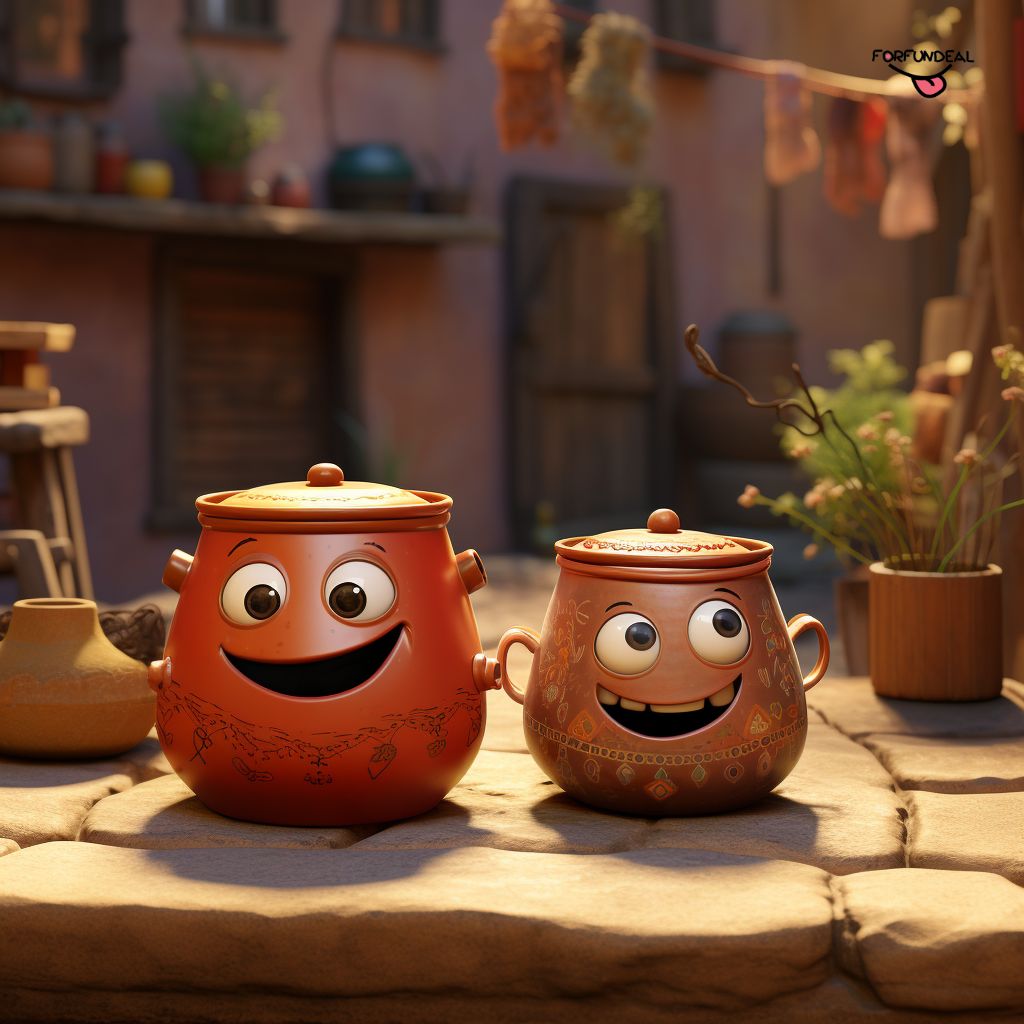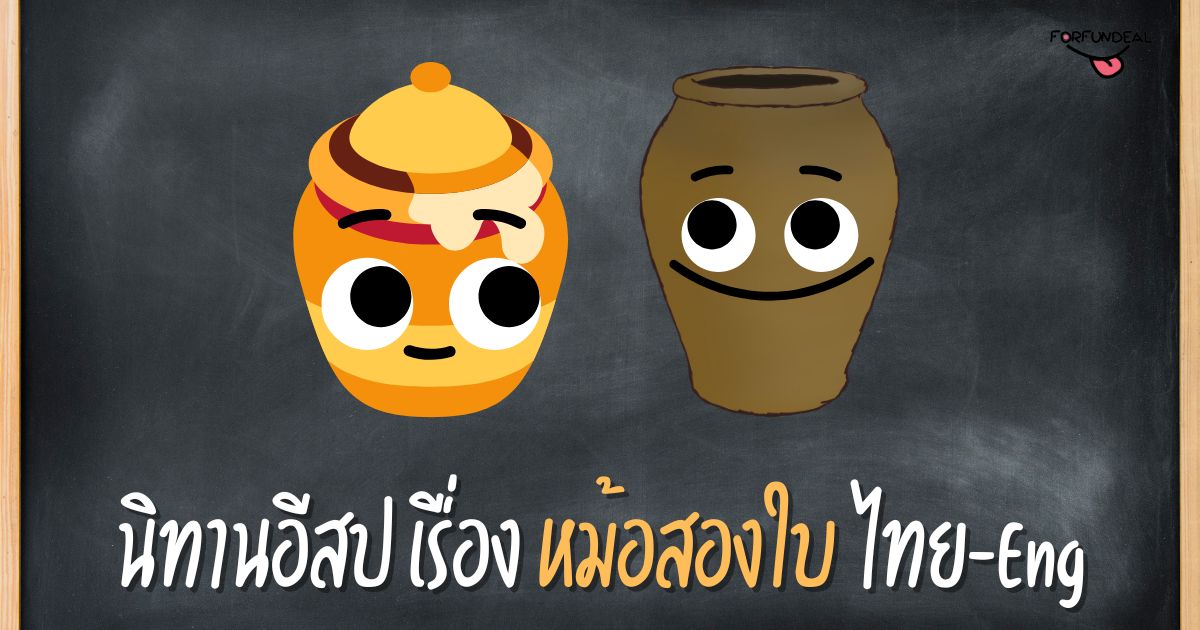“หม้อสองใบ” เป็นนิทานอีสปที่สอนเราถึงคุณค่าของบุคคลไม่อาจกำหนดได้เพียงรูปลักษณ์ภายนอกเพียงอย่างเดียว แต่มันอยู่ภายในด้วย และจุดประสงค์กับการให้คุณค่าแก่ผู้อื่นและตนเอง
นิทานอีสปเรื่องหม้อสองใบ
กาลครั้งหนึ่ง ณ หมู่บ้านเล็กๆ แห่งหนึ่ง มีหม้ออยู่สองใบ ใบหนึ่งทำด้วยทองเหลืองและอีกใบทำด้วยดินเหนียว หม้อทั้งสองถูกใช้ตักน้ำจากบ่อน้ำในหมู่บ้านทุกวัน
Once upon a time, in a small village, there were two pots. One was made of brass, and the other was made of clay. Both pots were used to fetch water from the village well every day.
หม้อทองเหลืองภูมิใจในรูปลักษณ์ที่แวววาว และเชื่อว่ามันเหนือกว่าหม้อดินธรรมดาๆ มาก มันมักจะโอ้อวดว่า “ข้าสวยและแข็งแรงไม่เหมือนเจ้า หม้อดินธรรมดาๆ เปราะบาง ผู้คนชื่นชมข้าและมองว่าข้ามีค่า”
The brass pot was proud of its shiny appearance and believed it was far superior to the humble clay pot. It would often boast, “I am so beautiful and strong, unlike you, plain and fragile clay pot. People admire me and consider me valuable.”
หม้อดินที่ดูเรียบง่ายและอ่อนน้อมถ่อมตนจะตอบอย่างใจเย็นว่า “ใช่ หม้อทองเหลืองที่รัก เจ้าช่างงดงามและแข็งแกร่งจริงๆ แต่อย่าลืมว่า เราทั้งสองมีจุดประสงค์เดียวกันคือขนน้ำจากบ่อน้ำไปยังหมู่บ้าน รูปลักษณ์ของเราอาจ ต่างกันแต่หน้าที่ของเรายังเหมือนเดิม”
The clay pot, being simple and humble, would respond calmly, “Yes, dear brass pot, you are indeed beautiful and strong. But remember, we both serve the same purpose – to carry water from the well to the village. Our appearances may differ, but our function remains the same.”
วันหนึ่งขณะที่พวกเขากำลังเดินกลับจากบ่อน้ำ หม้อทองเหลืองก็สังเกตเห็นรอยร้าวเล็กๆ ในหม้อดิน มันพูดเย้ยหยันว่า “โอ้ ดูรอยร้าวในร่างกายของเจ้าสิ เจ้าอ่อนแอและมีข้อบกพร่องมาก เจ้าแบกน้ำด้วยความไม่สมบูรณ์เช่นนี้ได้อย่างไร”
One day, as they were walking back from the well, the brass pot noticed a small crack in the clay pot. Mockingly, it said, “Oh, look at that crack in your body! You are so weak and flawed. How can you carry water with such imperfections?”
หม้อดินไม่สะทกสะท้านต่อคำเย้ยหยันตอบอย่างนุ่มนวลว่า “ใช่ ข้ามีรอยร้าวแต่ไม่ใช่ตำหนิ มันช่วยให้น้ำไหลไปตามทาง หล่อเลี้ยงโลกและทำให้ดอกไม้บาน ร่างกายที่สมบูรณ์แบบของคุณเก็บทุกสิ่งไว้ น้ำไม่บุบสลาย แต่ไม่ได้มีไว้เพื่อจุดประสงค์อื่น”
The clay pot, unfazed by the taunts, replied gently, “Yes, I have a crack, but it is not a flaw. It allows water to trickle along the way, nourishing the earth and making flowers bloom. Your perfect body keeps all the water intact, but it doesn’t serve any other purpose.”
เมื่อได้ยินเช่นนี้ หม้อทองเหลืองก็เงียบลง ตระหนักถึงภูมิปัญญาในคำพูดของหม้อดินเหนียว
Upon hearing this, the brass pot fell silent, realizing the wisdom in the clay pot’s words.
เมื่อวันเวลาผ่านไป หม้อทองเหลืองยิ่งถูกกลืนกินด้วยความเย่อหยิ่ง ในขณะที่หม้อดินเหนียวยังคงอ่อนน้อมถ่อมตนและรู้สึกขอบคุณต่อจุดประสงค์ของมัน
As days passed, the brass pot became more and more consumed by its pride, while the clay pot remained humble and grateful for its purpose.
วันหนึ่งขณะที่พวกเขากำลังออกจากบ่อน้ำอีกครั้ง ความเย่อหยิ่งของหม้อทองเหลืองทำให้มันเปลี่ยนไปใช้เส้นทางอื่น และพยายามอวดความงามของมันให้ชาวบ้านเห็น อย่างไรก็ตาม เส้นทางเต็มไปด้วยก้อนกรวดและหิน ทำให้หม้อทองเหลืองลื่นและตกลงไป
One day, as they were again on their way from the well, the brass pot’s arrogance led it to take a different path, trying to show off its beauty to the villagers. However, the path was filled with pebbles and rocks, causing the brass pot to slip and fall.
เมื่อกระแทกพื้น ตัวของหม้อทองเหลืองก็บุบและมีรอยขีดข่วน ทำให้มันผิดรูป รู้สึกอับอายและไร้ประโยชน์
As it hit the ground, the brass pot’s body got dented and scratched, leaving it deformed. It felt humiliated and useless.
หม้อดินเผารีบวิ่งไปด้านข้างและพูดว่า “เพื่อนรัก ข้าขอโทษที่เห็นคุณบาดเจ็บ ข้าจะช่วยคุณกลับไปที่บ่อน้ำ”
The clay pot rushed to its side and said, “Dear friend, I’m sorry to see you hurt. Let me help you back to the well.”
หม้อทองเหลืองซึ่งตอนนี้ถ่อมตัวแล้วตอบว่า “ขอบคุณ เจ้าหม้อดินเหนียวที่รัก สำหรับความกรุณาของเจ้า เจ้าพูดถูกมาตลอด รูปร่างหน้าตาไม่สำคัญเท่าจุดประสงค์และการบริการ”
The brass pot, now humbled, replied, “Thank you, dear clay pot, for your kindness. You were right all along – appearances do not matter as much as purpose and service.”
ตั้งแต่วันนั้นเป็นต้นมา หม้อทองเหลืองก็เรียนรู้ที่จะให้ความสำคัญกับสติปัญญาและความอ่อนน้อมถ่อมตนของหม้อดินเผา พวกเขาทั้งสองยังคงรับใช้หมู่บ้านต่อไป ขนน้ำจากบ่อน้ำด้วยกัน และไม่มีใครตัดสินหม้อทองเหลืองจากรอยบุบและรอยขีดข่วนอีกต่อไป
From that day on, the brass pot learned to value the clay pot’s wisdom and humility. They both continued to serve the village, carrying water together from the well, and no one judged the brass pot by its dents and scratches anymore.

นิทานเรื่องนี้สอนให้รู้ว่า
“ความอ่อนน้อมถ่อมตนและจุดมุ่งหมายมีค่ามากกว่ารูปลักษณ์ภายนอกและความภาคภูมิใจ”
- ความอ่อนน้อมถ่อมตนเหนือความเย่อหยิ่ง: เรื่องราวสอนเราถึงความสำคัญของความอ่อนน้อมถ่อมตนเหนือความเย่อหยิ่ง หม้อดิเหนียวนแม้จะมีรูปลักษณ์ที่เรียบง่าย แต่ยังคงอ่อนน้อมถ่อมตนและชาญฉลาด ในขณะที่ความทะนงตนของหม้อทองเหลืองนำไปสู่ความพินาศ
- ชื่นชมความแตกต่าง: หม้อแต่ละใบมีคุณสมบัติพิเศษเฉพาะตัว และเรื่องราวเตือนใจให้เราชื่นชมและให้คุณค่ากับความแตกต่างของผู้อื่น
- จุดประสงค์และการบริการ: เรื่องราวเน้นความสำคัญของการเข้าใจจุดประสงค์ของเราและรับใช้ผู้อื่นด้วยความสามารถเฉพาะตัวของเรา โดยไม่คำนึงถึงรูปลักษณ์ภายนอก
- เรียนรู้จากความผิดพลาด: หม้อทองเหลืองเรียนรู้จากความผิดพลาดและตระหนักถึงคุณค่าของความอ่อนน้อมถ่อมตนและความกตัญญูกตเวที
“Humility and purpose are more valuable than appearance and pride.”
- Humility over pride: The story teaches us the importance of humility over pride. The clay pot, despite its simple appearance, remained humble and wise, while the brass pot’s pride led to its downfall.
- Appreciating differences: Each pot had its unique qualities, and the story reminds us to appreciate and value the differences in others.
- Purpose and service: The story highlights the significance of understanding our purpose and serving others with our unique abilities, regardless of appearances.
- Learning from mistakes: The brass pot learned from its mistake and realized the value of humility and gratitude.
โดยสรุปแล้วนิทานเรื่องนี้สอนให้เรารู้จักความอ่อนน้อมถ่อมตน ความกตัญญูกตเวที และการเข้าใจเป้าหมายในชีวิตของเรา มันเตือนเราว่าคุณค่าที่แท้จริงไม่ได้อยู่ที่รูปร่างหน้าตา แต่อยู่ที่วิธีที่เรารับใช้และมีส่วนสร้างประโยชน์ให้กับโลกรอบตัวเรา

